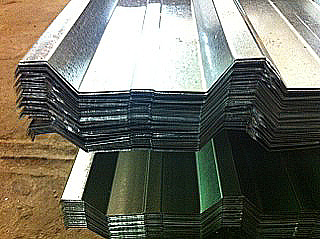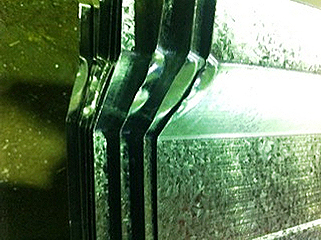Get the Best Deal when Importing Rollforming Machinery from the Far East


Imagine spending hundreds of thousands of US Dollars to import rollforming machinery from the Far East, only to discover upon its arrival, that the machine does not work and cannot be fixed.
Many businesses, daunted by the high cost of metalforming equipment, decide to buy from the Far East. Their reasons are twofold: prices are often far lower than their American or European counterparts, and local engineers often do not have the experience for advanced machines such as high speed lines with in-line punching configurations.
Greg Fuchsloch, CEO of Metalforming Technologies South Africa, has been in the metalforming industry for 18 years and has seen local entrepreneurs forced to shut their doors after buying insufficient machinery from the Far East.
“One client only realised after the machinery was installed that it couldn’t run the material he had bought at a value of R2 million,” says Greg. “The only way to rectify the problem was to either buy a new machine or buy new material. It simply would not rollform the material that the client intended profiling.”
Greg says that if the price seems too good to be true, there is something to be concerned about.
So, is it possible to procure good quality equipment from the Far East? Greg believes it is.
“It is possible to find well-made machinery at lower prices, but you need to know exactly what you are looking for and where to go,” says Greg. “Take the time to do plenty of research and visit each machine builder personally, even if it means visiting upward of forty manufacturers.”
Greg shares seven tips on what to watch out for when sourcing a good deal on imported equipment:
1) Can Replacement Parts be found in South Africa?
Before purchasing any machinery, look carefully at each component and ensure replacement parts can be sourced locally. Some parts and components in the machines are critical in their design, and it is not worth taking a chance with cheaper, poorly designed alternatives. Look specifically at PLCs, electric switches, electric motors, drives and hydraulic components. Ensure the product list is detailed and steer towards brand name components. They may cost a little more initially, but the machines will stay in good working order for longer.
“While you’re at it, double check that all of the components used are authentic,” says Greg. “In many cases, known brand components are not supported in the Far East.”
2) Get a Service Agreement and Warranties
Take special care when looking at the service agreement. Some manufacturers offer a one year warranty on paper but will refuse to replace the part when it breaks, suggesting the component broke through operator error. The supplier must agree to fly out a technician within a few days and at their own expense, or work with an approved local company who is able to service or repair the equipment.
“A local company recently bought four machines at a very cheap price from the Far East,” says Greg. “Three roofing panel machines and an insulated panel machine, none of which were in working order when they arrived.” The client thought it was a small problem and brought in an engineering company to look at the machine. They were unable to fix it and so turned to me to see if I could help. After looking at the machines I determined that they were so poorly designed that the components could not even be used separately. The only option was to dump the machines and start over. The client wasn’t happy with my findings and showed me the door. Unfortunately his business didn’t survive this very expensive lesson.” Be sure to inspect the machines in the Far East before shipment.
3) Can the Machine Rollform Local Steel?
Steel material used in South Africa is often different to that used where the machine is being manufactured, so make sure you’ve established whether the machine you’re about to buy is able to rollform to local material specs.
Greg says, “The best way of doing this is by sending a sample of the material to the manufacturer. Or better yet, be at the factory when it is tested to make sure the final product is up to scratch. This can become a very time consuming process, especially if the machine is not compatible initially. You might find yourself in a hotel room for three weeks while they re-engineer the machine, or flying back and forth until you’re happy with the end result.” Simply put, don’t ship the machine until you are entirely satisfied.
Chris Smith, a roofing contractor for the last thirty years, agrees. “Time and time again I’ve worked on projects where we couldn’t get the roofing to align because the profiles had been rolled on inadequately designed machines, delaying the project and costing extra money,” says Chris. “Guys come into this industry all the time, thinking of starting their own production lines without doing adequate research. For guys like me who have to work with the end product, it is critical that we know that the material has been profiled to standard.”
4) Are there Enough Rollforming Stations?
Make sure you use a manufacturer who has the technology to build you a machine that fits your requirements. This is of particular importance especially when steel has been made harder to compensate for being thinner; enough rollforming stations must be included in the line to ensure sprung steel retains its newly formed shape. The line must be pre-engineered using a profile designed by a computerised engineering programme. This allows for material to be formed rather than forced into a required profile.
5) What is the Delivery Date, and what are the Repercussions for Late Delivery?
Have precautions in place for possible problems such as late delivery. Ensure that the company you are dealing with is proficient in English and able to communicate your requirements and any possible future problems you may experience.
“Alternatively use a local company who deals in machinery, who knows the lay of the land and has done this many times before,” says Greg. “You might pay a little more up front, but it will save you a ton of heartache, lost production time and money in the end if you buy from a reputable company.”
6) Is the Supplier also the Manufacturer?
Not all Far East manufacturers have an export licence and so they use a local middle man to manufacture the machinery. It’s hard to tell which one you’re working with, especially when the massive factory floor is filled with many machines you assume are made on the premises or at least by the same company. The agent often doesn’t have the technical expertise to answer your questions or adequately understand your requirements.
Visit the factory yourself; there is no way around it. Make sure you see the factory and not just the showroom, warehouse or someone else’s factory. And take a translator with you; some bigger companies have staff who can speak English, but most of the technical staff cannot.
7) Get a Technical Manual in English
Finally, he recommends getting a technical manual written in English. “It often happens that I get a frantic call from buyers who can’t use their machines because they haven’t been supplied with a manual and can’t figure out how to get it working,” Greg concludes.
Despite the obvious obstacles, Greg does believe that it is possible to find a good deal if you’re prepared to put in extra time and money to research what you are getting, or work with an established and approved company with years of experience.
So when is an inferior Far East rollforming machine good enough?
Greg believes that Far East machines are an option for slow rollforming lines with simple profiles, no punching requirements and less accurate parts being produced. “Also,” says Greg, “anticipate some repairs, modifications and replacement of parts.”
Rollforming lines required to run at high speeds, with in-line punching and accurate profiles with specified ratios, need an accurate machine. If not, you could end up regretting your bargain buy.

Email Us: sales@metalformingtechsa.com
Call Us: +27 (0) 83 273 8322










